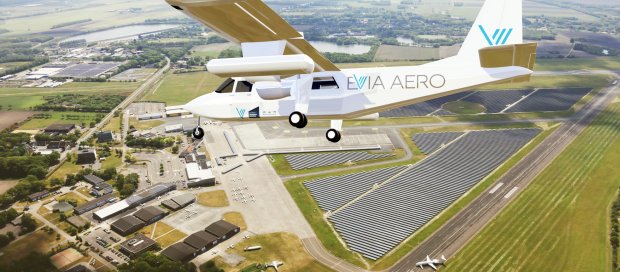Evia Aero Backs Cranfield Plans For Larger Hydrogen-Powered Regional Airliner
 Credit: Cranfield Aerospace Solutions
Credit: Cranfield Aerospace Solutions
Charles Alcock / November 15, 2022
German regional airline Evia Aero has agreed to work with Cranfield Aerospace Solutions (CAeS) to develop a hydrogen-powered 19-seat aircraft. In a November 15 announcement, the companies said they are exploring plans to either convert an existing aircraft or develop a new model, with Evia provisionally agreeing to add 10 of either option to its fleet.
This week, the Bremen-based operator also agreed to purchase five more examples of the hydrogen-powered version of the nine-seat Britten-Norman Islander for which CAeS is developing a modification. Under a letter of intent signed in June 2022, it had committed to 10 of the kits, which are to be installed under a supplemental type certificate. Leasing group Monte has also agreed to add the aircraft to its portfolio.
The envisaged 19-seat aircraft would use a scaled-up version of the hydrogen-fuel-cell-based propulsion system that CAeS is working on. Announcing plans for the larger system during the Farnborough International Airshow, the company indicated that it is likely to apply this first with an existing aircraft. The company recently secured further investments from backers in the United Arab Emirates and the U.S.
Evia Aero will now help to establish the targeted performance specifications and maintenance requirements. The partners have said that they want to have the converted Islanders ready to enter service in 2025. The aircraft’s existing engines will be replaced by a hydrogen fuel cell and electric motors, running on hydrogen gas.
According to Evia Aero founder and CEO Florian Kruse, several airports have already agreed to support hydrogen-powered flights. In October, the company signed a separate letter of intent covering 25 of Eviation’s nine-passenger all-electric aircraft.
Separately, CAeS last week announced that it is working on plans to apply its hydrogen fuel cell technology to Dronamics’s Black Swan long-range cargo drone. Initially, the single propeller of the remotely piloted aircraft will be powered by a horizontally opposed four-stroke Rotax engine, which is expected to run on biofuels such as Zero Petroleum’s Zero SynAvgas.
Dronamics wants to transition to hydrogen or synthetic fuels for the vehicle, which it says will have a range of 1,550 miles (2,500 kilometers) and a payload of 770 pounds. The Bulgarian start-up claims the Black Swan will have operating costs of just $2.50 per pound of freight carried. It will be able to take off from and land on surfaces as short as 400 meters.
Dronamics' Black Swan remotely piloted cargo aircraft will enter service with a Rotax engine, but the company plans to switch to a hydrogen propulsion system. (Image: Dronamics)
In May, Malta’s Civil Aviation Directorate issued Dronamics a European Union light UAS operator certificate that the company intends to use to launch its own air freight services. Dronamics told FutureFlight that it has already started flight testing a full-scale prototype and that it aims to be ready to begin making production aircraft in 2023. It has not said when a hydrogen-powered version might be ready.
Aerospace engineer Konstantin Rangelov and his brother Svilen founded Dronamics. The Sofia-based company employs more than 150 people and is planning a larger investment round to support mass production and the scaling up of its air cargo services.
The Black Swan is set to compete with other extended-range cargo drones such as Sabrewing's Rhaegal.


